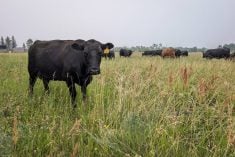A Chinese delegation led by that country’s president Hu Jintao has signed on to make Canada the first BSE-affected country ever to export beef to China.
Agriculture Minister Gerry Ritz, Prime Minister Stephen Harper and International Trade Minister Peter Van Loan announced the “breakthrough agreement” as one of a list of bilateral signings Thursday afternoon in Ottawa.
The agreement “provides the foundation for a staged approach to full market access for Canadian beef and beef products,” the government said in a release.
The first of those stages includes access to the Chinese market for Canadian boneless beef derived from animals under 30 months of age (UTMs), and for industrial-grade Canadian beef tallow.
Read Also

U.S. livestock: Cattle futures mixed
Cattle futures on the Chicago Mercantile Exchange were mixed on Thursday, after dropping sharply the previous session. The December live…
Chinese officials will follow up with a visit to Canadian slaughter facilities within the next week, the Canadian Cattlemen’s Association noted in a separate release.
The Canada Beef Export Federation (CBEF) estimates the Chinese market for Canadian beef and tallow will be be worth about $110 million a year once the stage of full market access is reached, including bone-in products.
In the meantime, Canada could potentially export $40 million per year of tallow and $10 million in boneless UTM beef to China for a total of $50 million in incremental export sales from this first stage, the CCA said.
Further official discussions aimed at full access for Canadian beef will continue in the near future, the CCA added.
China is the fourth largest economy in the world and is already Canada’s third most important agriculture and agri-food trading partner, Canadian Meat Council president Brian Read noted Friday in a separate release.
China’s gross domestic product is growing at unprecedented rates, hitting nine per cent in 2008, the CMC said. “With a Chinese population greater than 1.3 billion, Canada’s beef industry has an incredible opportunity to fill China’s needs with more Canadian beef.”
“This is tremendous news for Canadian beef producers as access to the rapidly growing Chinese market means significant market advantage and a better bottom line for Canadian producers,” Ritz said Thursday.
“Canada produces the best beef in the world and we have the consistency, safety and quality that China is looking for. What we have accomplished today recognizes our mutual interests, strong partnership and trade relationship based on sound science.”
“Lingering”
China was among several countries to shut its ports to Canadian beef and cattle in 2003 following the appearance of Canada’s first domestic case of BSE in an Alberta cow.
Sixteen other domestic cases later, many countries have recognized Canada’s measures to keep BSE (bovine spongiform encephalopathy) out of the food and feed supply and reopened their ports of entry to Canadian products and livestock.
The World Organization for Animal Health (OIE) has since 2007 officially categorized Canada as a “controlled risk” country for BSE, based on its BSE surveillance; bans on the use of ruminant tissues in ruminant feed; bans to keep specified risk materials (SRMs, the tissues known to harbour the malformed proteins causing BSE in infected animals) out of food and feed; and its policy of destroying any BSE-infected animals and their birth herds or birth cohorts.
The controlled-risk designation allows for safe trade in all beef and cattle under specified conditions.
“I am very pleased that Prime Minister Harper and Ministers Ritz and Van Loan continue to share the CCA’s high priority of expanding access for Canadian beef in international markets,” CCA president Travis Toews said in the association’s release.
“China is among one of a few important markets that we have placed a very high priority on gaining access,” he said. The CCA noted its other top priorities for removing “lingering” BSE-related bans include those in Japan, Korea, Taiwan and Mexico.
“This visit by President Hu confirms that the Canada-China strategic partnership is gaining momentum as we mark 40 years of diplomatic relations and chart a course for the future,” Harper said in a separate release.
“Today’s bilateral signings and the hundreds of thousands of Chinese citizens visiting Canada’s Expo 2010 pavilion in Shanghai are signs that relations between our countries are flourishing.”
Among the other agreements signed Thursday were a memorandum of understanding (MOU) to facilitate group travel from China to Canada, cementing Canada’s “approved destination” status.
















